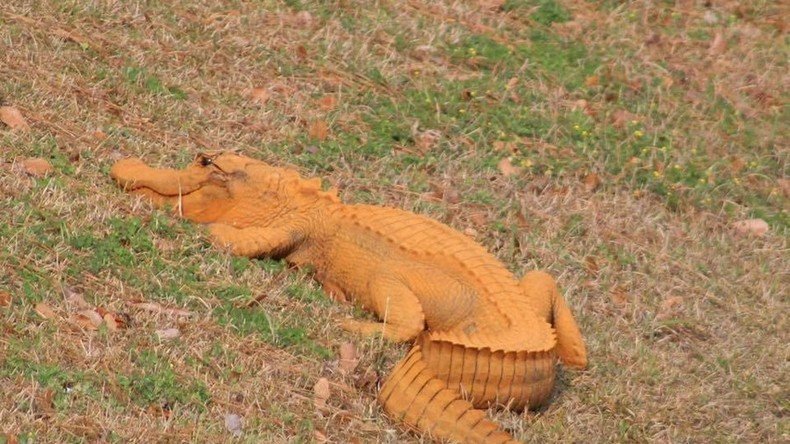'Trumpagator’: Mysterious orange alligator gets snapped in South Carolina

An alligator with bright orange skin has been spotted in South Carolina, puzzling locals and inspiring the nickname “Trumpagator.”
Democrats worst nightmares coming true. Even the environment is turning against them. #Trumpagator! pic.twitter.com/ICaLHQ9sbh
— Invigilator (@Invigilare) February 9, 2017
So the gators here in the lowcountry showing support for our president. Meet #TRUMPAGATOR found just now in a pond by my house. Cute lil guy pic.twitter.com/Rq781xRVcz
— Jennifer S (@JenniferSheff63) February 7, 2017
The unique reptile was discovered on the banks of a retention pond in Tanner Plantation in Hanahan. Its photograph was shared on a local Facebook page where people commented on its unusual skin tone.
“I’ve never seen anything like it,” one commenter said. “It looks like clay.”
"I guess he used too much self tanner?!?!" said another.
"It's the Trumpagator of Self-Tanner Plantation," one local joked.
@postandcourier I say it got a hold on a bag of Cheeto's. My fingers turn orange when I eat them. Just a guess though.
— William F Wood JR (@williambeaurega) February 9, 2017
While the gator’s hue has inspired jokes, the reason for its pallor may not be so amusing.
According to herpetologist Josh Zalabak, the gator’s skin tone is likely the result of an environmental mishap.
“Algae – maybe some pollutant in the water, but it’s hard to say unless the water is tested,” he said.
Jay Butfiloski, of the South Carolina Department of Natural Resources, said the color may have come from spending the winter in a rusty pipe.
“It would not be a new species, just a genetic anomaly if it were naturally orange,” he said.
Much like a bad fake tan, the alligator is expected to soon shed its skin and its orange tone.
Gator rodeo: Girl allowed to ride 8ft alligator’s back as mother films (VIDEO) https://t.co/T2BHYEgMnxpic.twitter.com/GdpNZ9SKSO
— RT America (@RT_America) January 10, 2017












